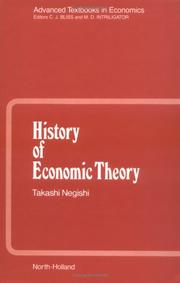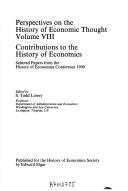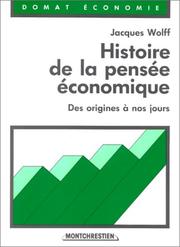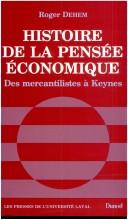| Listing 1 - 10 of 62 | << page >> |
Sort by
|

ISBN: 044470437X 0080508154 0585489653 9780444704375 Year: 1989 Volume: 26 Publisher: Amsterdam North-Holland
Abstract | Keywords | Export | Availability | Bookmark
 Loading...
Loading...Choose an application
- Reference Manager
- EndNote
- RefWorks (Direct export to RefWorks)
Economic schools --- Economics --- History. --- AA / International- internationaal --- 330.40 --- Geschiedenis van het economisch en sociaal denken --- Evolution historique de la pensée économique et sociale: généralités --- History of the economic and social thinking --- 330.40 Geschiedenis van het economisch en sociaal denken --- 330.40 Evolution historique de la pensée économique et sociale: généralités --- 330.40 History of the economic and social thinking --- Geschiedenis van het economisch en sociaal denken. --- History --- Economics - History. --- ECONOMIE POLITIQUE --- ETUDE ET ENSEIGNEMENT
Book
ISBN: 2717811362 9782717811360 Year: 1986 Publisher: Paris : Economica - anthropos,
Abstract | Keywords | Export | Availability | Bookmark
 Loading...
Loading...Choose an application
- Reference Manager
- EndNote
- RefWorks (Direct export to RefWorks)
AA / International- internationaal --- 330.1 --- 330.40 --- Geschiedenis van het economisch en sociaal denken --- Evolution historique de la pensée économique et sociale: généralités --- History of the economic and social thinking --- 330.40 Geschiedenis van het economisch en sociaal denken --- 330.40 Evolution historique de la pensée économique et sociale: généralités --- 330.40 History of the economic and social thinking --- Domein en natuur van de staathuishoudkunde. --- Geschiedenis van het economisch en sociaal denken. --- Economics --- History --- Domein en natuur van de staathuishoudkunde --- Economics - History
Book
ISBN: 9782757820933 Year: 2011 Publisher: Paris Seuil
Abstract | Keywords | Export | Availability | Bookmark
 Loading...
Loading...Choose an application
- Reference Manager
- EndNote
- RefWorks (Direct export to RefWorks)
Economics --- Economie politique --- History --- Histoire --- AA / International- internationaal --- 330.00 --- 330.40 --- Geschiedenis van het economisch en sociaal denken --- Evolution historique de la pensée économique et sociale: généralités --- History of the economic and social thinking --- 330.40 Geschiedenis van het economisch en sociaal denken --- 330.40 Evolution historique de la pensée économique et sociale: généralités --- 330.40 History of the economic and social thinking --- Economische en sociale theorieën: algemeenheden. --- Geschiedenis van het economisch en sociaal denken. --- Economische en sociale theorieën: algemeenheden --- Économie politique

ISBN: 1852784482 Year: 1992 Publisher: Aldershot Edward Elgar
Abstract | Keywords | Export | Availability | Bookmark
 Loading...
Loading...Choose an application
- Reference Manager
- EndNote
- RefWorks (Direct export to RefWorks)
AA / International- internationaal --- 330.40 --- NBB congres --- Geschiedenis van het economisch en sociaal denken --- Evolution historique de la pensée économique et sociale: généralités --- History of the economic and social thinking --- 330.40 Geschiedenis van het economisch en sociaal denken --- 330.40 Evolution historique de la pensée économique et sociale: généralités --- 330.40 History of the economic and social thinking --- Geschiedenis van het economisch en sociaal denken. --- Conferences - Meetings

ISBN: 2707604577 Year: 1991 Publisher: Paris Montchrestien
Abstract | Keywords | Export | Availability | Bookmark
 Loading...
Loading...Choose an application
- Reference Manager
- EndNote
- RefWorks (Direct export to RefWorks)
AA / International- internationaal --- 330.40 --- Geschiedenis van het economisch en sociaal denken --- Evolution historique de la pensée économique et sociale: généralités --- History of the economic and social thinking --- 330.40 Geschiedenis van het economisch en sociaal denken --- 330.40 Evolution historique de la pensée économique et sociale: généralités --- 330.40 History of the economic and social thinking --- Geschiedenis van het economisch en sociaal denken. --- Economics --- Économie politique --- History. --- Histoire. --- History
Book
ISBN: 2080801422 9782080801425 Year: 2005 Volume: 598 Publisher: Paris,
Abstract | Keywords | Export | Availability | Bookmark
 Loading...
Loading...Choose an application
- Reference Manager
- EndNote
- RefWorks (Direct export to RefWorks)
Les débats qui animent la vie économique contemporaine ne peuvent être compris indépendamment de la forme qu'ils ont revêtue dans le passé. Comment, par exemple, appréhender les controverses actuelles sur le libéralisme économique, si l'on ignore que la question de l'interventionnisme de l'État partageait déjà les physiocrates et les mercantilistes, qu'elle devait opposer plus tard les socialistes utopiques et Marx aux thèses d'Adam Smith et de Ricardo, et que, dans les années 1930, elle allait rebondir avec la " nouvelle donne " keynésienne ? Quand on évoque le communisme, sait-on que Platon en son temps s'est prononcé pour la propriété commune et l'interdiction de tout échange marchand, tandis qu'Aristote était favorable à la propriété privée et, dans certaines limites, à l'échange marchand ? L'histoire de la pensée économique est une nécessité, sauf à imaginer que l'économie politique puisse se réduire, comme elle tend malheureusement à le faire aujourd'hui, à des modèles mathématiques dont les soubassements doctrinaux et théoriques demeurent des non-dits. L'auteur fait ici le pari d'un ouvrage bref. Une histoire de la pensée économique qui ne saurait prétendre à l'exhaustivité, mais qui permet à chacun de se faire une vue d'ensemble des grands courants de pensée et de comprendre les filiations, les oppositions, les avancées et reculs qui jalonnent cette histoire.
Economic Thought --- AA / International- internationaal --- 330.40 --- Geschiedenis van het economisch en sociaal denken --- Evolution historique de la pensée économique et sociale: généralités --- History of the economic and social thinking --- 330.40 Geschiedenis van het economisch en sociaal denken --- 330.40 Evolution historique de la pensée économique et sociale: généralités --- 330.40 History of the economic and social thinking --- Geschiedenis van het economisch en sociaal denken. --- Economics --- Economie politique --- History --- Histoire
Book
ISBN: 2706102667 9782706102660 Year: 1985 Publisher: Grenoble Presses Universitaires de Grenoble
Abstract | Keywords | Export | Availability | Bookmark
 Loading...
Loading...Choose an application
- Reference Manager
- EndNote
- RefWorks (Direct export to RefWorks)
AA / International- internationaal --- 330.40 --- Geschiedenis van het economisch en sociaal denken --- Evolution historique de la pensée économique et sociale: généralités --- History of the economic and social thinking --- 330.40 Geschiedenis van het economisch en sociaal denken --- 330.40 Evolution historique de la pensée économique et sociale: généralités --- 330.40 History of the economic and social thinking --- Geschiedenis van het economisch en sociaal denken. --- Economie politique --- Histoire. --- Economie politique - Histoire. --- ECONOMIE POLITIQUE --- ETUDE ET ENSEIGNEMENT

ISBN: 2040156224 276377038X 9782763770383 Year: 1984 Publisher: Quebec Presses de l'Université Laval
Abstract | Keywords | Export | Availability | Bookmark
 Loading...
Loading...Choose an application
- Reference Manager
- EndNote
- RefWorks (Direct export to RefWorks)
AA / International- internationaal --- 330.40 --- Geschiedenis van het economisch en sociaal denken --- Evolution historique de la pensée économique et sociale: généralités --- History of the economic and social thinking --- 330.40 Geschiedenis van het economisch en sociaal denken --- 330.40 Evolution historique de la pensée économique et sociale: généralités --- 330.40 History of the economic and social thinking --- Geschiedenis van het economisch en sociaal denken. --- Economics --- History --- Economie politique --- Histoire --- Économie politique --- Economics - History --- Doctrine politico-économique
Book
ISBN: 9782717854497 2717854495 Year: 2009 Publisher: Paris Economica
Abstract | Keywords | Export | Availability | Bookmark
 Loading...
Loading...Choose an application
- Reference Manager
- EndNote
- RefWorks (Direct export to RefWorks)
Après 1945, la pensée économique allemande a disparu de l'horizon intellectuel, y compris en Allemagne, comme si l'histoire politique du IIIe Reich imposait de tourner le dos à des traditions dont certains rejetons s'étaient fourvoyés dans les totalitarismes. Culturellement, la pensée économique allemande est pourtant bien enracinée depuis le caméralisme du XVIIIe siècle, en passant par l'économie politique allemande du XIXe siècle et en allant jusqu'à l'économie sociale de marché. L'ouvrage reprend des éléments de compréhension qui permettent d 'éviter trop d'approximations dans les comptes rendus habituels de ces oppositions. La pensée économique allemande référencée ici va de Hegel à Eucken. La réflexion sur les méthodes occupe une place de choix dans la pensée économique allemande qui provient sans doute de l'importance de la réflexion philosophique et notamment de la réflexion sur l'histoire. Elle est surtout plus " politique " et insiste sur la relation entre Territoire-Economie et Etat(s)-Justice sociale. De quoi relever les défis de la globalisation et éclairer la manière dont l'Allemagne a construit son rapport au monde du XXIe siècle.
Economic schools --- Economists --- Economics --- Economistes --- Economie politique --- History --- Histoire --- German economics --- Thought --- 19th-20th centuries --- AA / International- internationaal --- DE / Germany - Duitsland - Allemagne --- 330.40 --- 331.100 --- 330.08 --- Geschiedenis van het economisch en sociaal denken --- Evolution historique de la pensée économique et sociale: généralités --- History of the economic and social thinking --- 330.40 Geschiedenis van het economisch en sociaal denken --- 330.40 Evolution historique de la pensée économique et sociale: généralités --- 330.40 History of the economic and social thinking --- Geschiedenis van het economisch en sociaal denken. --- Economische geschiedenis: algemeenheden. --- Economisten. --- Economisten --- Economische geschiedenis: algemeenheden --- Economics - Germany - History --- Économistes allemands --- Économie politique --- Histoire.
Book
ISBN: 9780415554435 9780203806395 9781138807686 9781136654947 9781136654985 9781136654992 Year: 2011 Publisher: London Routledge
Abstract | Keywords | Export | Availability | Bookmark
 Loading...
Loading...Choose an application
- Reference Manager
- EndNote
- RefWorks (Direct export to RefWorks)
"In the nineteenth century and still in the early decades of the twentieth century textbooks of economics were quite different from those over which thousands of undergrads sweat blood today to prepare their exams. They pedagogical tools, rich of moralistic overtones and of practical indications addressed to policy makers. They were made to persuade both students and the ordinary layman about the benefits of the market order. They also indicated the rules of behaviour that were considered consistent with the smooth functioning of economic mechanisms. The book studies the origins and evolution of economic textbooks in the nineteenth and early twentieth century, up to the turning point represented by Paul Samuelson's Economics (1948), which became the template for all the textbooks of the postwar period. The case studies included in the book cover a large part of Europe, the British Commonwealth, the United States and Japan. Each chapter examines various types of textbooks, from those aimed at self-education to those addressed to university students, secondary school students, to the short manuals aimed at the popularisation of political economy among workers and the middle classes. An introductory chapter examines this phenomenon in a comparative and transnational perspective. This study on the archaeology of modern textbooks reveals the massive effort made by governments and academic authorities to construct and disseminate a system of economic representations and regulations that could be instrumental to establish and consolidate what Michel Foucault called a new type of governmentality, based on natural market laws and on Malthusian population mechanisms"-- "The book studies the origins and evolution of economic textbooks in the nineteenth and early twentieth century, up to the turning point represented by Paul Samuelson's Economics (1948), which became the template for all the textbooks of the postwar period. The case studies included in the book cover a large part of Europe, the British Commonwealth, the United States and Japan. Each chapter examines various types of textbooks, from those aimed at self-education to those addressed to university students, secondary school students, to the short manuals aimed at the popularisation of political economy among workers and the middle classes. An introductory chapter examines this phenomenon in a comparative and transnational perspective"--
Economic schools --- AA / International- internationaal --- 475 --- 330.40 --- 330.00 --- Geschiedenis van het economisch en sociaal denken --- Evolution historique de la pensée économique et sociale: généralités --- History of the economic and social thinking --- 330.40 Geschiedenis van het economisch en sociaal denken --- 330.40 Evolution historique de la pensée économique et sociale: généralités --- 330.40 History of the economic and social thinking --- Onderwijs van de politieke, economische en sociale wetenschappen. --- Geschiedenis van het economisch en sociaal denken. --- Economische en sociale theorieën: algemeenheden. --- Economics --- Économie politique --- Textbooks --- History --- Manuels d'enseignement --- Histoire --- Economic theory --- Political economy --- Social sciences --- Economic man --- Economische en sociale theorieën: algemeenheden --- Onderwijs van de politieke, economische en sociale wetenschappen
| Listing 1 - 10 of 62 | << page >> |
Sort by
|

 Search
Search Feedback
Feedback About
About Help
Help News
News